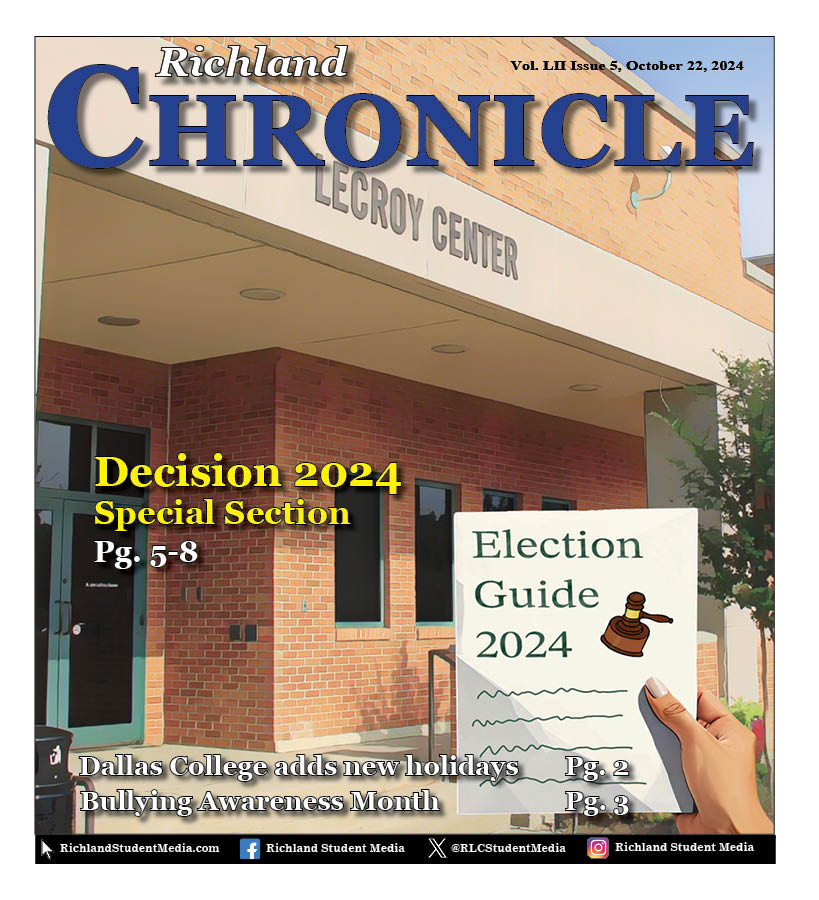PR Page 3 (egypt)
Rediscovering the lost Little Egypt neighborhood
Dara Jones and Ryan B. Duff – Staff Writers
A neighborhood in Northeast Dallas has a secret and Richland anthropology students are trying to dig it up. The Africa- American community, known as Little Egypt, is in the Lake Highlands neighborhood not far from Richland College.
According to history professor Dr. Clive Siegle, in the fall of 2015, he learned from a neighbor, who was a longtime resident, that there had once been an African-American settlement called Little Egypt across the street from his home. The community vanished in the 1960s. Most of the area had been turned into a shopping center, except for an empty lot across the street from his house.
Richland Students Liying Geng, Jane Ombongi, and Thao Nhi Phan Gridding at the site of the little egypt dig in dallas.
When he noticed the lot had been dug up, Siegle called anthropology professor, Dr. Tim Sullivan. “They’ve plowed the field,” he said.
The owner of the lot, Eastlake Veterinary Hospital, granted the professors permission to search for historical artifacts on the property. They later merged their history and anthropology classes to form a six-hour Honors Learning Community
The course, now in its third year, includes a project to reconstruct the history of Little Egypt through oral histories, aerial photographs, computer modeling, archaeological and genealogical research.
“I was not going to let it be erased,” Siegle said.
According to the professors, some examples of artifacts found at the site include bits of charcoal, wire, denim and other vestiges of days gone by. The students catalog the location of the artifacts to help put together a larger picture of what life once was like in the enclave. They seem to love the hands-on experience.
“When you’re digging, you’re actually excited. Maybe you can find something that will actually lead to something,” said Delphine Tuma, one of the student anthropologists.
When searching through land records, the professors were pleasantly surprised to discover that the McCoy family, former Little Egypt residents who had been interviewed extensively, were the former owners of the exact plot of land. Richland students are working with the family to create a 3D model of their family homestead.
Will and Sara Hill were the first residents of Little Egypt.
“Most other classes you don’t get to actually do what the profession entails, but this one, you do. So it’s kind of interesting,” said Luis Orozco, a student working on the project.
According to written material made available by the professors to the Chronicle, the origins of the Little Egypt settlement date back to Sept. 25, 1883 when former slaves Jeff and Hannah Hill purchased 110 acres of land at $10 an acre. It was also part of the land that Richland College now occupies.
The Hill property eventually became a farmland community. The Hill children and other families rented or bought property from the Hills and made their homes on the property.
The Hill family built a general store on the property, according to documents supplied by Siegel. A hotel and another building, possibly a dance hall, were built on the area sometime later. The community got its name from the Egypt Chapel Baptist Church.
“The community was primitive and did not have the modern conveniences of paved roads, water and sewer lines, although they shared electric and telephone lines,” Sullivan said.
During the post-World War II years, the rural land surrounding the property was transformed into housing developments that put pressure on the community to modernize.
“Little Egypt remained virtually the same as it had been in the 1800s until they came close to being condemned,” Sullivan said.
In 1961, community leaders met with a developer who wanted to build a shopping center on the property. Over the course of a year, an agreement was drafted to buy out all of the residents and move them to new homes with modern conveniences.
In May 1962, the entire community, headed by the Hill’s son Will and his wife Sara, relocated to other parts of the city. The bulldozers moved in and Little Egypt was no more. “It’s like a giant hand came down and swept it away,” Siegle said. Many of the residents moved to Oak Cliff along with the Egypt Chapel Baptist Church.






